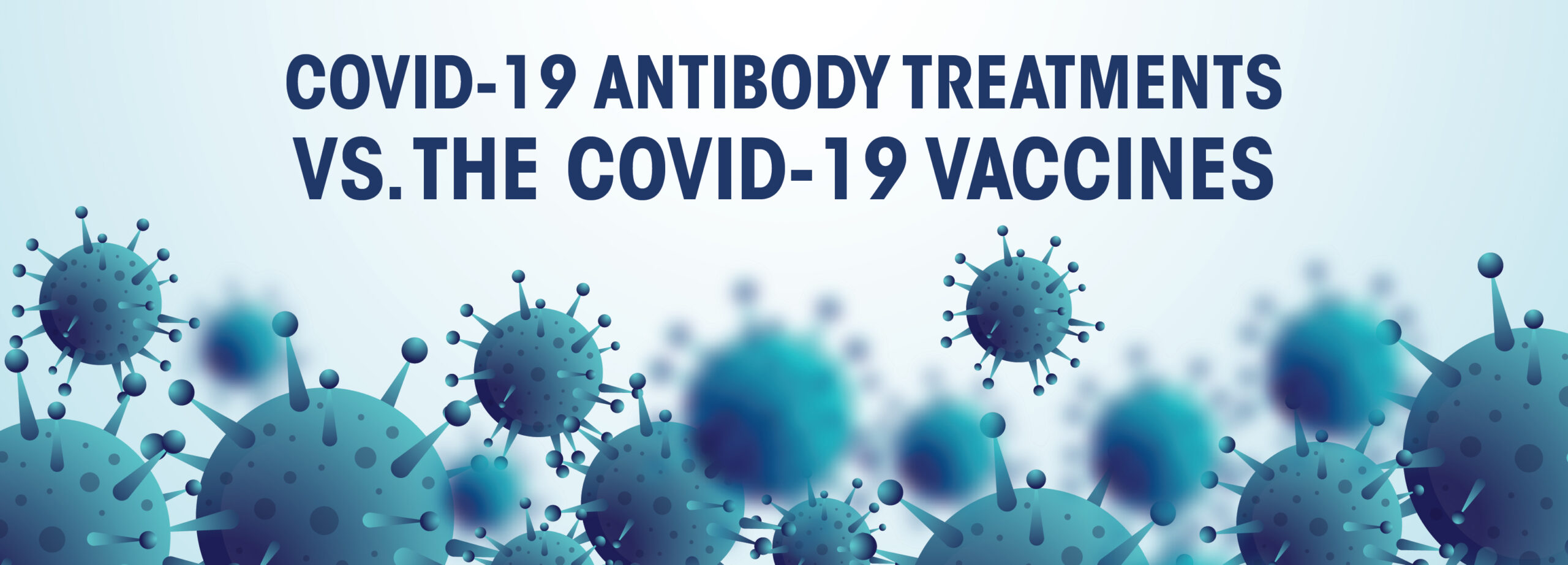
There are major benefits to both COVID-19 antibody treatments and COVID-19 vaccines, but their goals and methods are very different. Antibody treatment is most effective for those who are currently diagnosed with COVID-19 and require immediate treatment. The COVID-19 vaccine is to protect from future infection of COVID-19.
ANTIBODY TREATMENT
Who should get the COVID-19 antibody treatment?
This treatment is most effective for those who are currently diagnosed with COVID-19 and require immediate treatment. This treatment is NOT meant to protect from a future infection of COVID-19 like the vaccine may allow.
How does the COVID-19 antibody treatment work?
This treatment makes use of antibodies, a naturally produced molecule in our bodies. Usually, when a virus enters our body, our immune system can identify and fight the virus by having antibodies attach to it. The reason why COVID-19 has caused concern is that it is a novel virus, meaning our immune systems are likely not as well prepared to create antibodies for this virus quickly.
This treatment makes use of COVID-19 antibodies extracted from the blood donation of someone who has already recovered from COVID-19. Since this individual has already recovered and created antibodies to fight the virus, we can inject these antibodies into someone in need of treatment for the virus.
COVID-19 VACCINE
How does the COVID-19 Vaccine work?
The COVID-19 Vaccine was recently approved and carefully deployed in December 2020. Currently, there are two approved methods of receiving the vaccine; the one created by Pfizer and the one by Moderna. These vaccines are very similar in the technique they use to provide immunity from COVID-19 but slightly differ in how they are administered.
Both vaccines require two doses to be completely effective. Pfizer requires these two injections to be separated by 3 weeks, while Moderna requires these doses to be 4 weeks apart.
Both vaccines are unique in that they make use of mRNA to train our immune systems against the COVID-19 virus. This is exciting new technology because it does not make use of inactivated or “weakened” versions of the virus like other vaccines have in the past. These
vaccines use a molecule called mRNA which cells use as an instruction manual to make spike proteins. You may recall that the COVID-19 virus is unique for having spike proteins on its surface, and this mRNA code causes a cell in our bodies to present spike proteins as well. Our immune system then recognizes that this cell is irregular and creates antibodies to attach to and destroy this cell. These antibodies are effective against the COVID-19 virus too because the spike proteins are the same for both the virus and the cell, giving your body a “memory immune response”.
Should you get the COVID-19 vaccine?
If the COVID-19 vaccine is made available to you, it is recommended that you receive the treatment. The more people get vaccinated against the virus, the harder it will be for it to spread and cause illness around our communities. Getting vaccinated helps protect yourself, and those
around you from the spread of COVID-19. It is, however, still recommended to continue practicing social distancing and mask-wearing even after getting vaccinated until we know more about the vaccine’s ability against asymptomatic transmission
Is it safe?
Many have expressed worry over how relatively fast the COVID-19 vaccine has been developed, however, research has shown that these treatments are both very safe and effective. These vaccines were developed rapidly due to new technology that allowed researchers to analyze the virus quicker than usual, along with a great increase of volunteers who signed up for the clinical trials of these vaccines. These vaccines have been tested on over
70,000 people from a wide range of ages, health conditions, and ethnicities.
If you have a history of allergic reactions, what should you do?
If you have a history of severe allergic reactions to any of the ingredients in the Pfizer or Moderna vaccines, the vaccine may not be right for you. This includes individuals with allergies to Polyethylene Glycol (PEG) or Polysorbate. A full list of the ingredients in both vaccines is as follows:
Pfizer Vaccine ingredients:
mRNA, lipids ((4-hydroxybutyl)azanediyl)bis(hexane-6,1-diyl)bis(2-hexyldecanoate), 2 [(polyethylene glycol)-2000]-N,N-ditetradecylacetamide, 1,2-Distearoyl-sn-glycero-3-phosphocholine, and cholesterol), potassium chloride, monobasic potassium phosphate, sodium chloride, dibasic sodium phosphate dihydrate and sucrose.
Moderna Vaccine ingredients:
mRNA, lipids (SM-102, polyethylene glycol [PEG] 2000 dimyristoyl glycerol [DMG], cholesterol, and 1,2-distearoyl-sn-glycero-3-phosphocholine [DSPC]), tromethamine, tromethamine hydrochloride, acetic acid, sodium acetate and sucrose.
If you have a history of allergic reactions to any of the ingredients, please consult a doctor before making a decision.
Where can you get the COVID-19 vaccine?
Ohio is vaccinating in a phased approach for those who choose to be vaccinated. At this time, Ohioans age 80 and older are the first group eligible. Phase 1B of vaccine distribution includes the following audiences. When a new age group begins, vaccinations may not be complete for the previous age group.
- The week of Jan. 19: Ohioans 80 years of age and older.
- The week of Jan. 25: Ohioans 75 years of age and older; those with severe congenital or developmental disorders.
- The week of Feb. 1: Ohioans 70 years of age and older; employees of K-12 schools that wish to remain or return to in-person or hybrid models.
- The week of Feb. 8: Ohioans 65 years of age and older.
Please visit the COVID-19 Vaccination Program webpage for the most-up-to-date information on Ohio’s Phased Approach at vaccine distribution. Visit
vaccine.coronavirus.ohio.gov to search for providers vaccinating in the current phase near you.




Comments